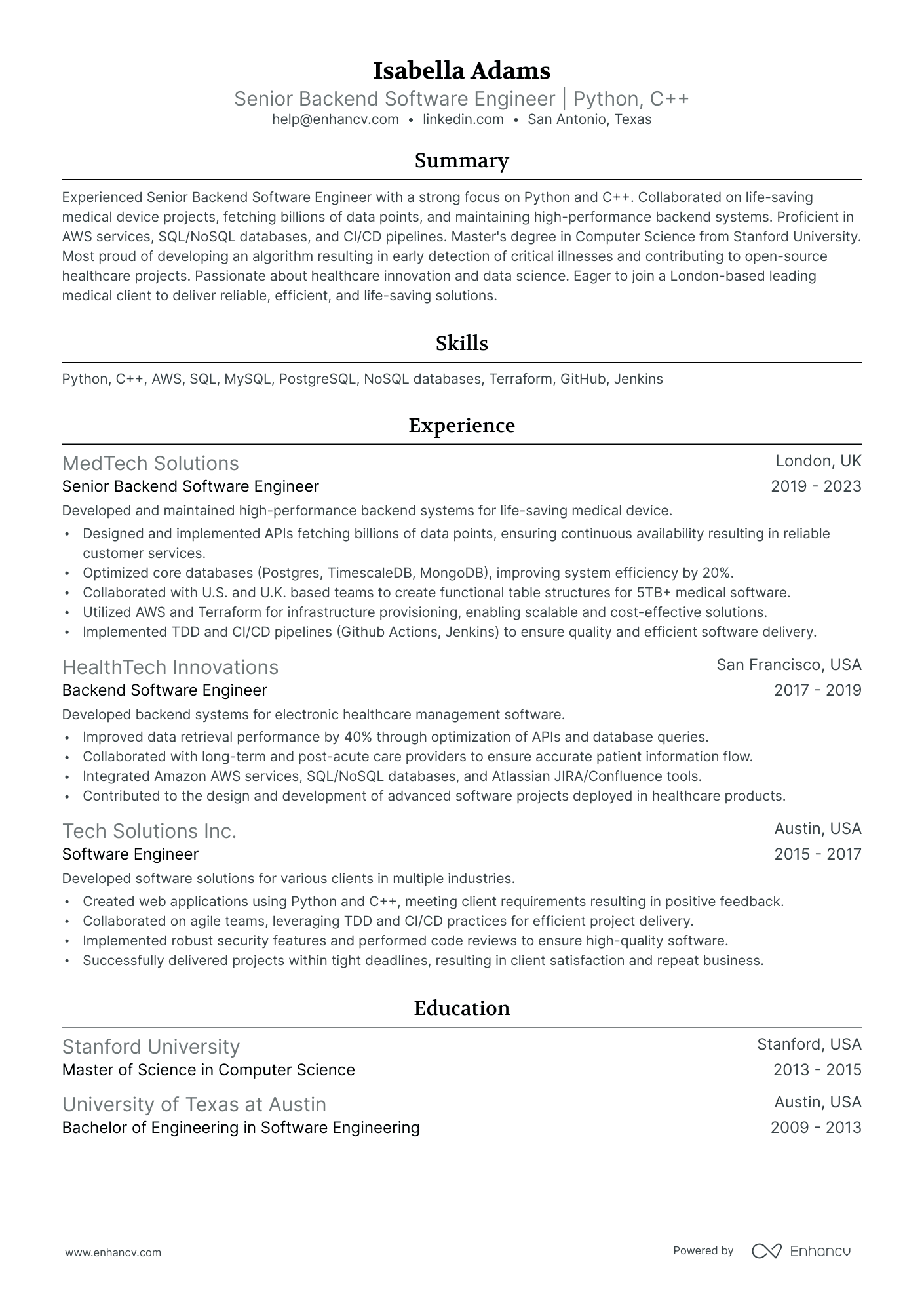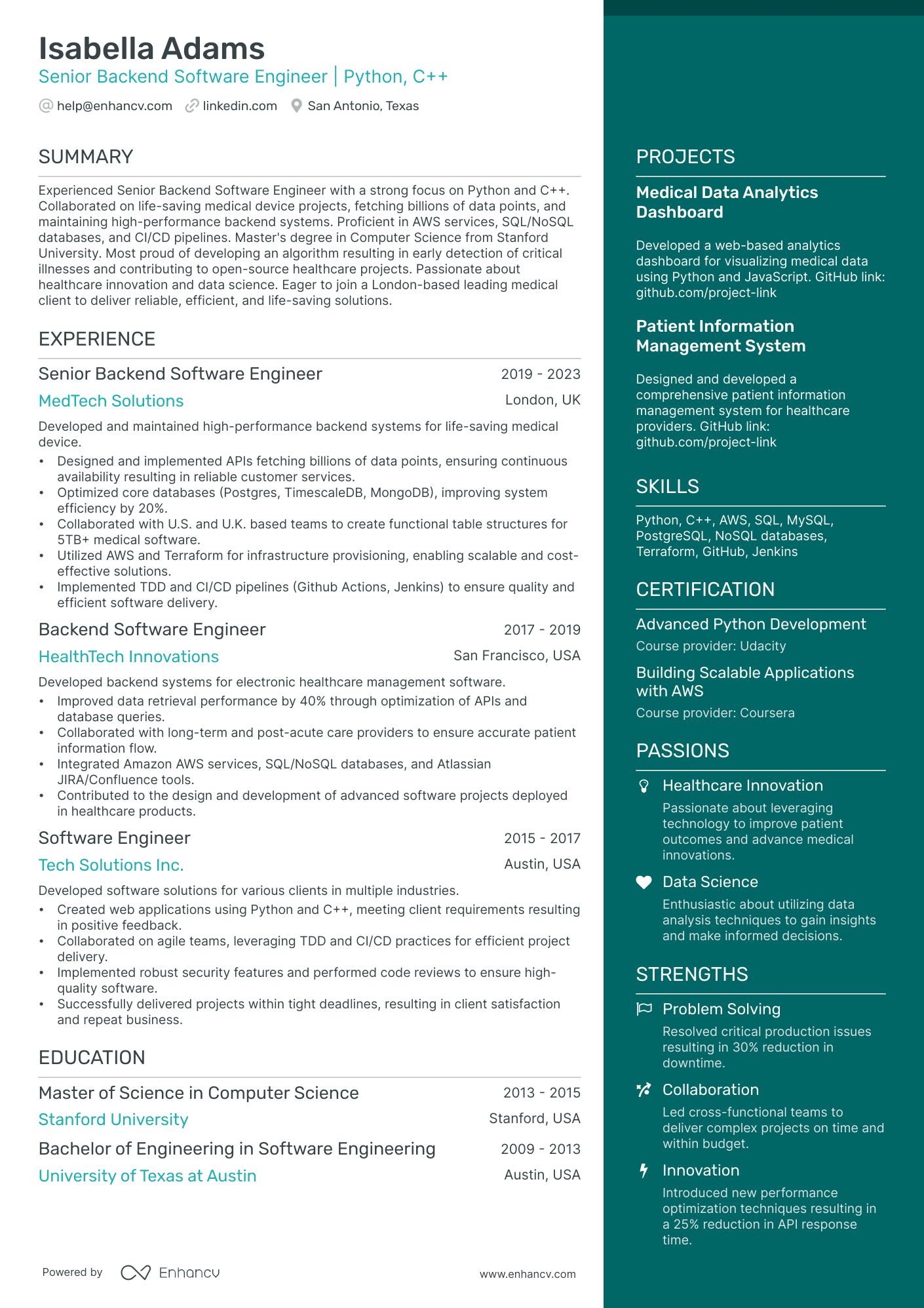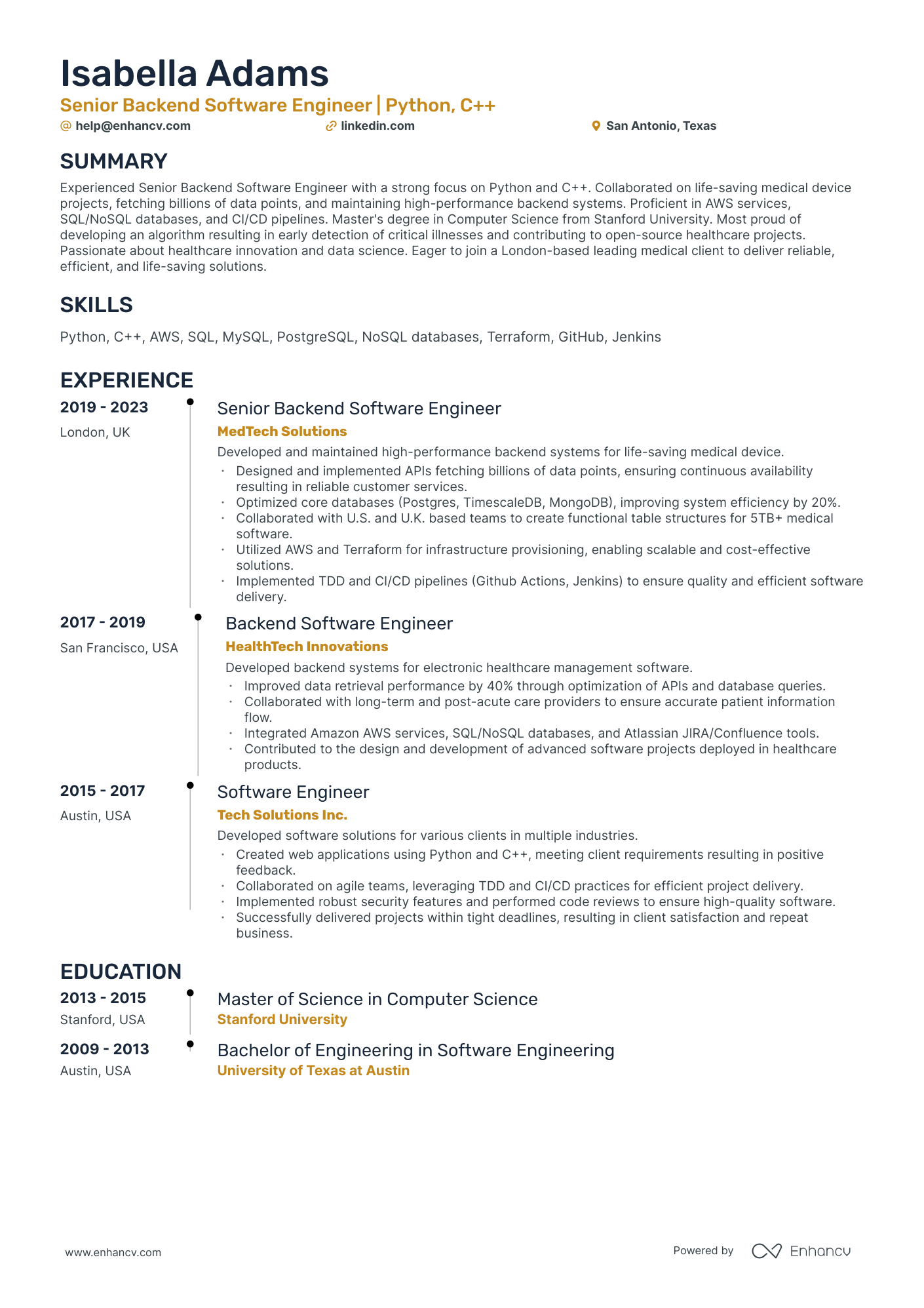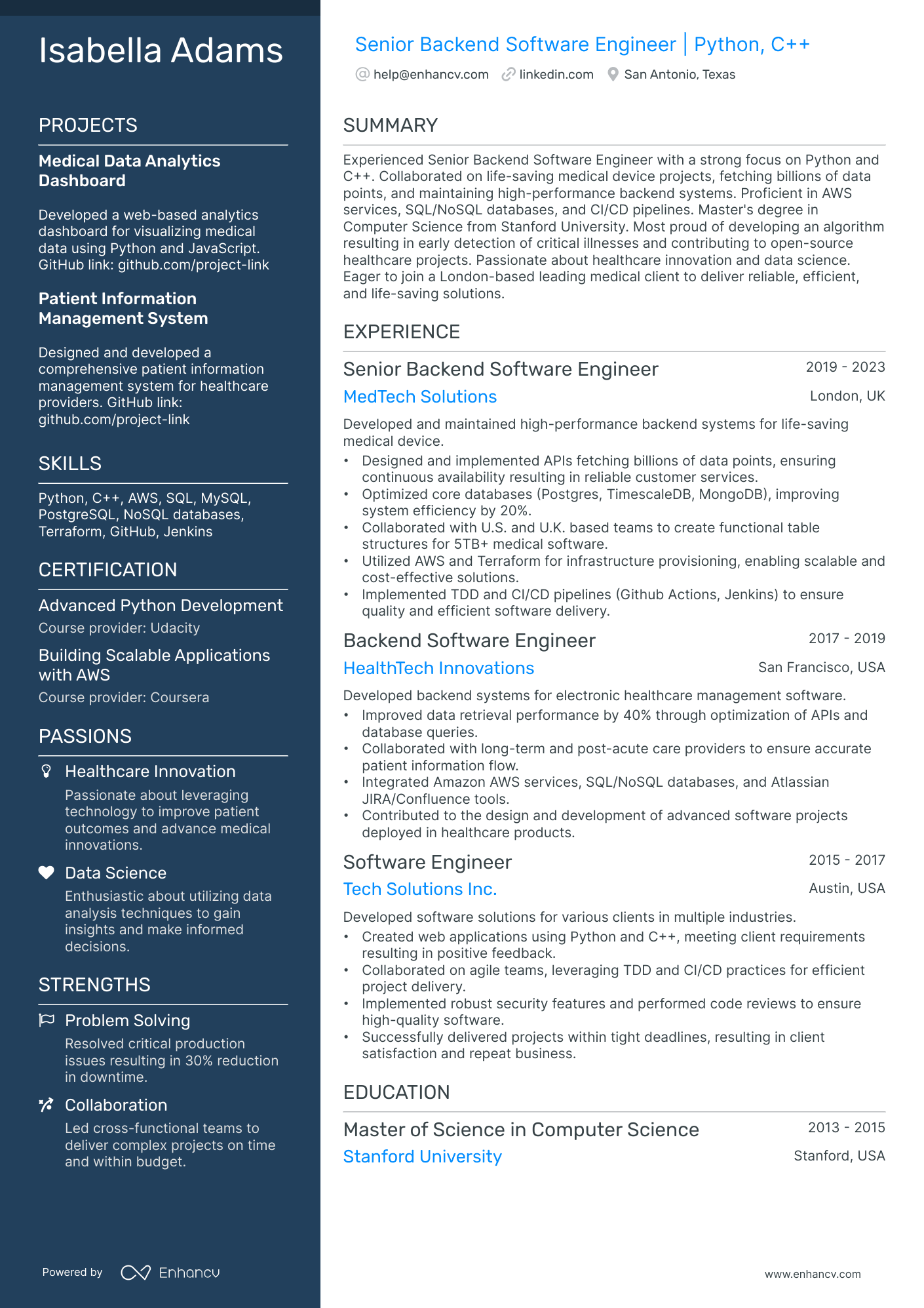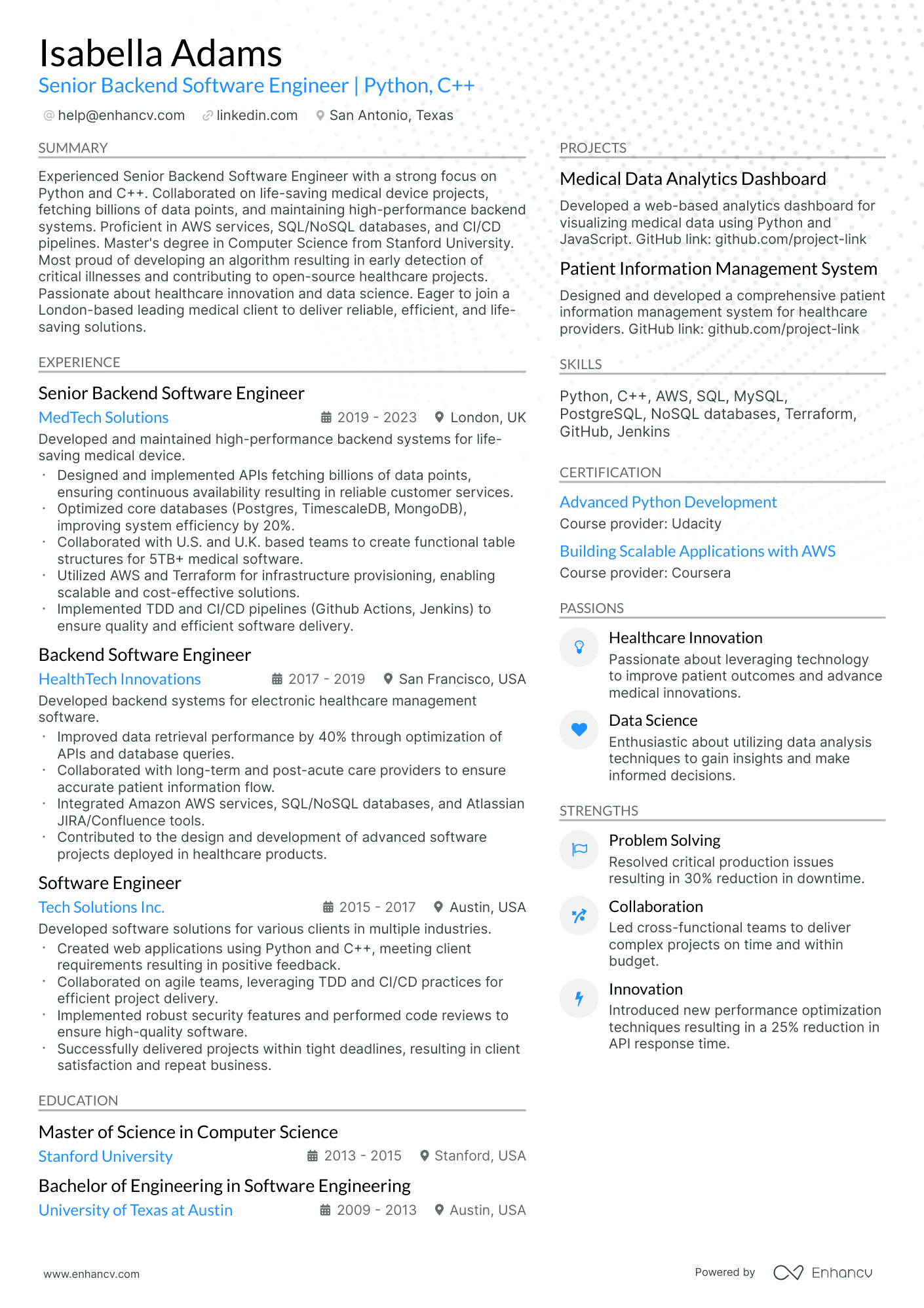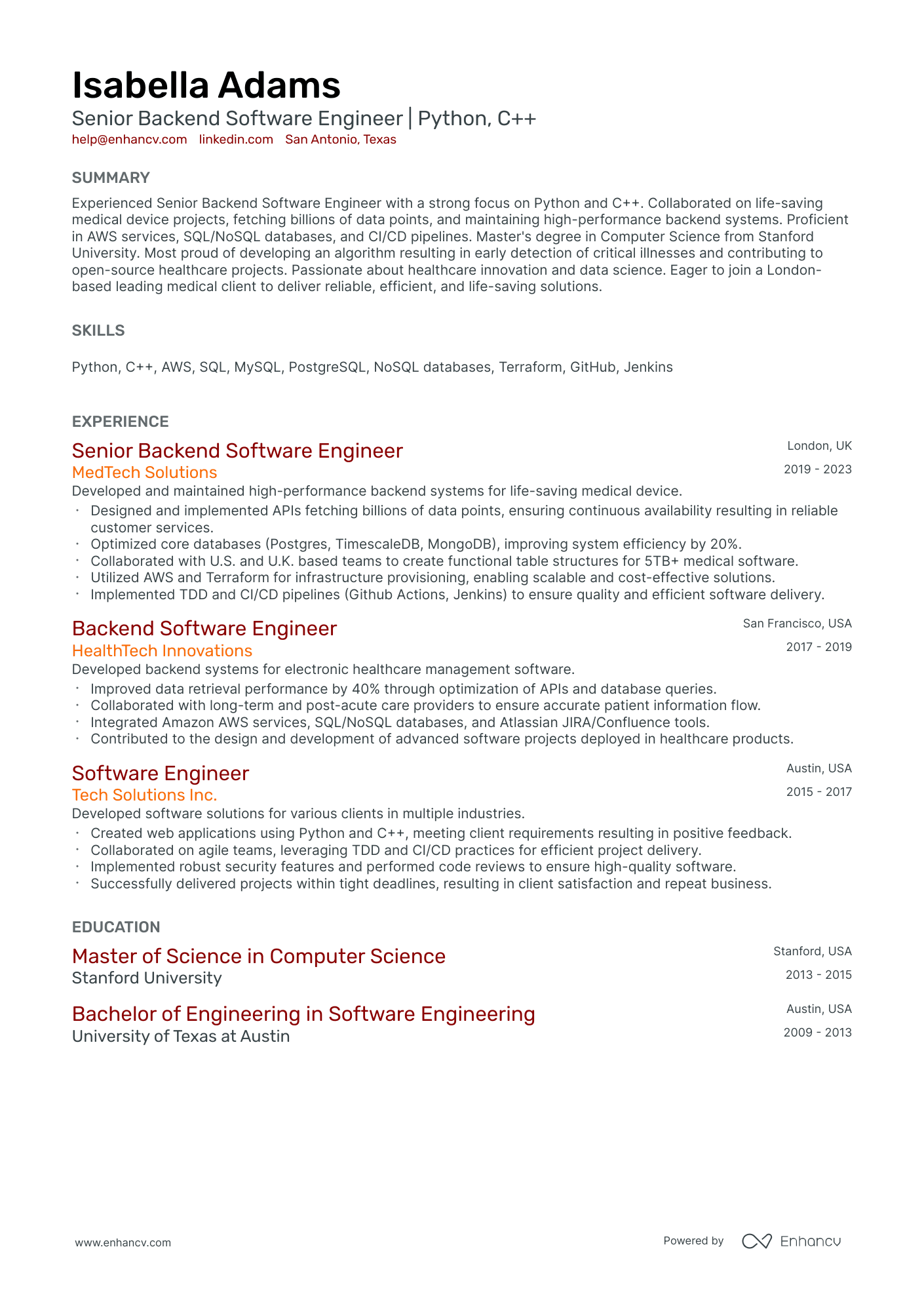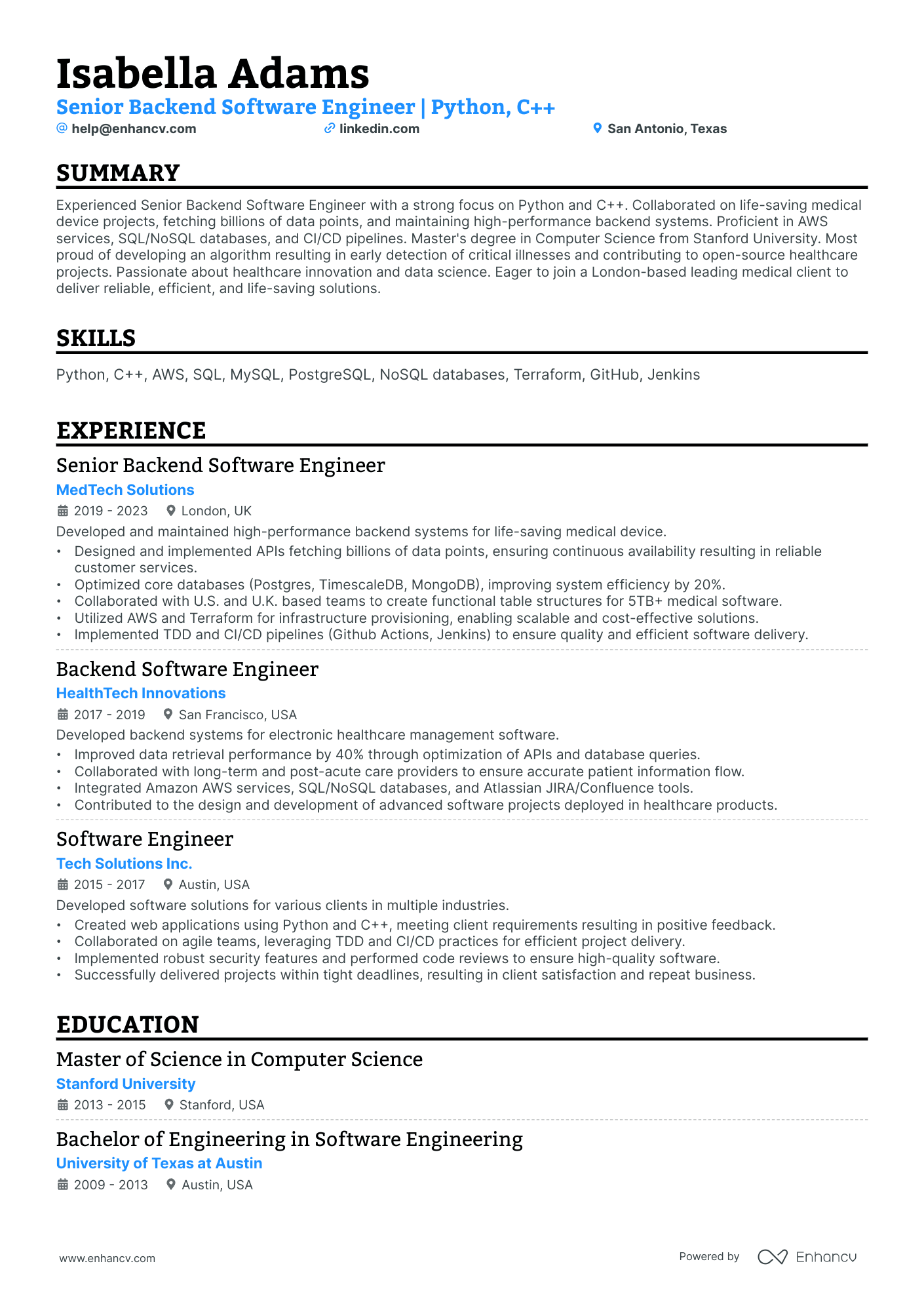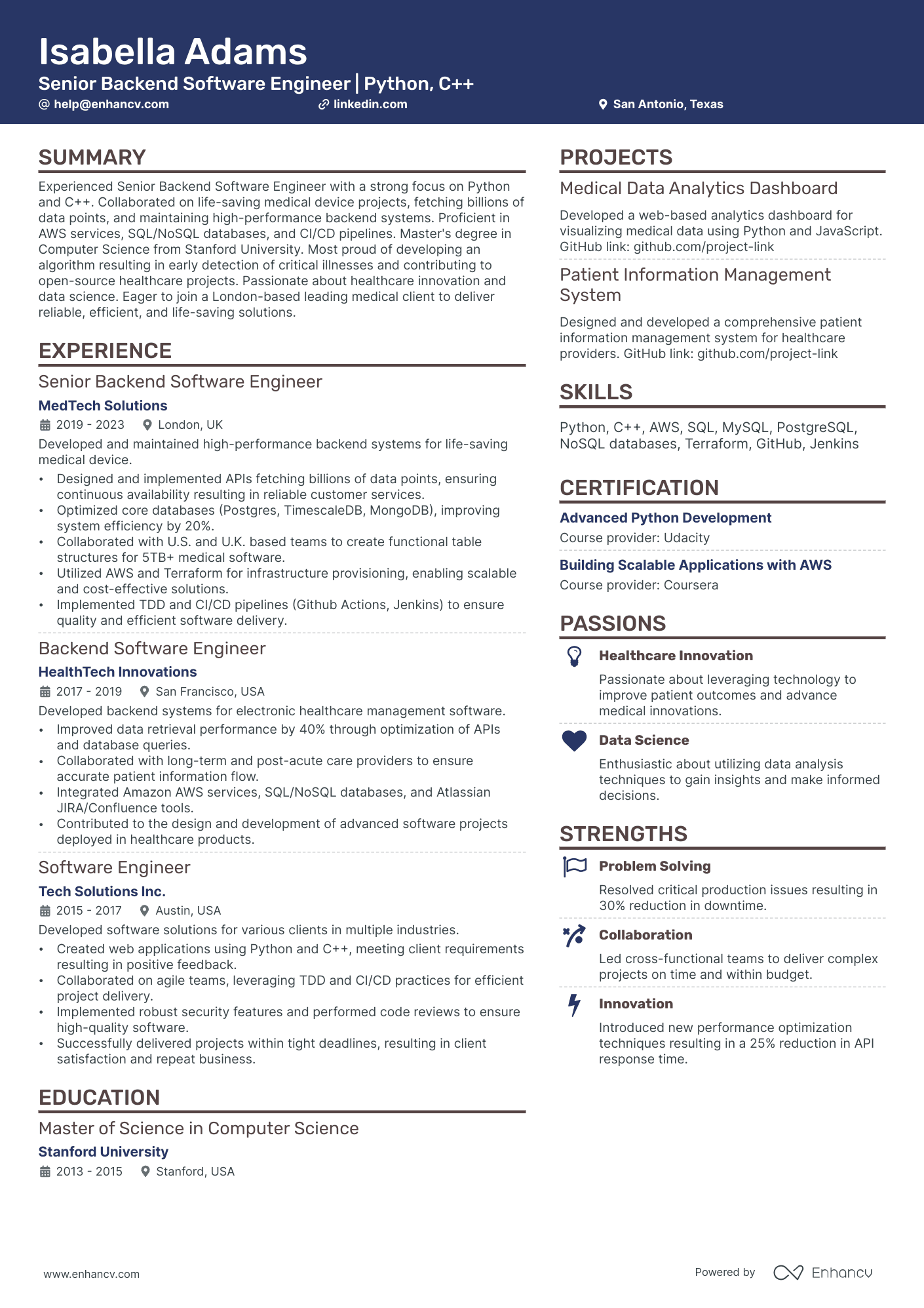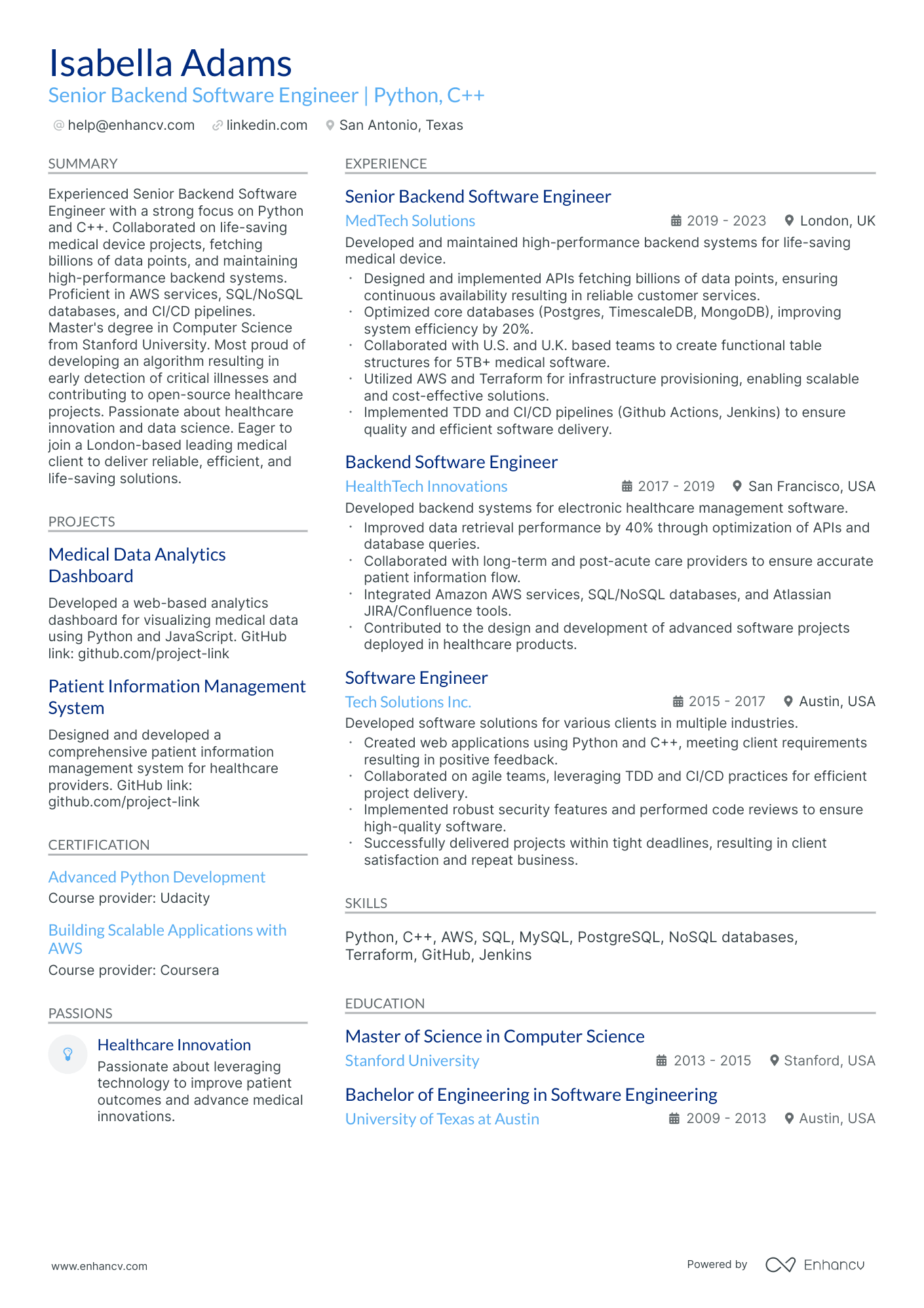One common challenge faced by aspiring AWS cloud practitioners is in articulating their practical knowledge of AWS services and understanding of cloud concepts on a resume. Our guide offers clear instructions and examples on how to effectively showcase your AWS skills and comprehension of cloud principles, helping you create a compelling narrative for potential employers.
Our AWS cloud practitioner guide will help you perfect your resume by explaining you how to:
- Alight your AWS cloud practitioner resume with the role you're applying for ensuring it will be read by the applicant tracking system.
- Tailor your specific AWS cloud practitioner experience to get the attention of recruiters.
- List your relevant education to impress hiring managers.
- Discover job-winning AWS cloud practitioner professional resume examples to inspire writing yours.
Recommended reads:
crafting a stellar AWS cloud practitioner resume format
Navigating the maze of resume formatting can be challenging. But understanding what recruiters prioritize can make the process smoother.
Wondering about the optimal format, the importance of certain sections, or how to detail your experience? Here's a blueprint for a polished resume:
- Adopt the reverse-chronological resume format. By spotlighting your latest roles upfront, you offer recruiters a snapshot of your career trajectory and recent accomplishments.
- Your header isn't just a formality. Beyond basic contact information, consider adding a link to your portfolio and a headline that encapsulates a significant achievement or your current role.
- Distill your content to the most pertinent details, ideally fitting within a two-page limit. Every line should reinforce your candidacy for the AWS cloud practitioner role.
- To preserve your resume's layout across different devices and platforms, save it as a PDF.
Keep in mind market-specific formats – for example, a Canadian resume might follow a different structure.
Upload your resume
Drop your resume here or choose a file. PDF & DOCX only. Max 2MB file size.
Pro tip
Keep your AWS cloud practitioner resume clear and concise. Top professionals narrate their career stories while highlighting their strengths.
Essential sections for a standout AWS cloud practitioner resume:
- The top section should combine your header—with accurate contact details—and a concise summary or objective that encapsulates your professional achievements.
- An experience section that chronicles your career trajectory and how each role contributed to your professional development.
- Highlight significant achievements that demonstrate the practical application of your skills, leading to tangible results.
- Include industry-recognized certifications to underscore your technical proficiency or interpersonal skills.
- Detail your educational background relevant to the field.
What recruiters want to see on your resume:
- Experience with AWS services: Knowledge and experience in managing and operating systems on AWS is key. Examples include EC2, S3, RDS, and Lambda.
- Certifications: Having the AWS Certified Cloud Practitioner certification or other relevant AWS certifications can significantly increase attractiveness to recruiters.
- Understanding of cloud concepts: Recruiters will look for understanding of essential cloud concepts such as cloud architecture, deployment models, and service models.
- Knowledge of security fundamentals: Knowledge of AWS' shared responsibility model, identity and access management (IAM), and other security best practices in a cloud environment is important.
- Hands-on Experience: Demonstrating hands-on experience in implementing, troubleshooting, and maintaining AWS-based applications can set you apart from others.
Recommended reads:
Strategies for crafting your AWS cloud practitioner resume experience section
When detailing your AWS cloud practitioner resume experience, it's essential to pair responsibilities with tangible achievements.
Consider including:
- Key responsibilities, emphasizing their significance to your role, team, or organization.
- Experiences that have fostered your technical acumen or professional growth.
- Metrics that underscore your contributions and successes.
- Challenges you've addressed and the solutions you've implemented.
- Strategies you've devised and their measurable impact on growth.
Your experience section is pivotal in making a lasting impression on recruiters. To inspire you, we've curated real-world AWS cloud practitioner examples:
- Designed and implemented AWS CloudFormation templates to automate infrastructure provisioning processes.
- Optimized AWS S3 storage architecture, resulting in a 30% reduction in storage costs.
- Implemented AWS Lambda functions for real-time data processing and event-driven workflows.
- Managed AWS EC2 instances and load balancers to ensure high availability and scalability of web applications.
- Developed AWS CloudWatch alarms and monitoring dashboards to proactively identify performance bottlenecks.
- Implemented automated backup and disaster recovery solutions using AWS S3 and EBS snapshots.
- Migrated on-premises databases to Amazon RDS, resulting in improved scalability and cost savings.
- Implemented security measures following AWS best practices, resulting in zero security incidents during annual audits.
- Designed and implemented AWS CloudFront CDN for faster content delivery and reduced latency.
- Architected and deployed highly available and fault-tolerant applications on AWS using Auto Scaling and Elastic Load Balancing.
- Implemented AWS Identity and Access Management (IAM) policies for granular access control and improved security.
- Optimized database performance by fine-tuning Amazon RDS instance parameters and implementing read replicas.
- Developed serverless applications using AWS Lambda and API Gateway, resulting in reduced infrastructure costs.
- Implemented AWS Elastic Beanstalk for easy deployment and management of web applications.
- Designed and implemented data lake architecture on AWS using S3, Glue, and Athena for big data processing.
- Implemented AWS CloudTrail for auditing and tracking changes made to AWS resources.
- Migrated legacy applications to AWS using services like AWS EC2, S3, and RDS.
- Designed and implemented disaster recovery strategies using AWS Route 53 and multiple Availability Zones.
- Deployed and managed scalable Kubernetes clusters on AWS using Amazon EKS.
- Developed CI/CD pipelines using AWS CodePipeline and AWS CodeBuild for automated application deployments.
- Implemented cost optimization strategies, resulting in a 20% reduction in monthly AWS expenses.
- Designed and implemented AWS VPC architecture for secure network isolation and connectivity.
- Optimized database performance by implementing read replicas and query caching in Amazon RDS.
- Implemented centralized log management using AWS CloudWatch Logs and Elasticsearch.
- Developed serverless microservices using AWS Lambda, API Gateway, and DynamoDB for a highly scalable application.
- Implemented infrastructure-as-code using AWS CloudFormation to automate resource provisioning and configuration.
- Performed security assessments and vulnerability scanning of AWS environments, ensuring compliance with industry standards.
- Designed and implemented AWS solutions across multiple accounts and regions, meeting diverse business requirements.
- Developed cost optimization strategies, resulting in significant savings of over $100,000 annually.
- Led a team in the migration of a large-scale application to AWS, ensuring minimal downtime and uninterrupted service.
Quantifying impact on your resume
<ul>
Tips for AWS cloud practitioner newcomers launching their careers
Lacking extensive experience for that AWS cloud practitioner role? No worries.
Sometimes, hiring managers go for the unexpected candidate when they see potential.
Here's how to convince them you're the right fit:
- Opt for the functional skill-based or hybrid formats to highlight your unique professional value.
- Always tailor your AWS cloud practitioner resume to emphasize the most critical requirements, usually listed at the top of the job ad.
- Compensate for limited experience with other relevant sections like achievements, projects, and research.
- In your AWS cloud practitioner resume objective, pinpoint both your achievements and how you envision your role in the position.
Recommended reads:
Pro tip
Remember, the experience section isn't just about traditional roles. It's a space to highlight all professional learning, whether from internships, contract roles, research projects, or other relevant experiences. If it's added value to your skill set for the AWS cloud practitioner role, it deserves a mention.
AWS cloud practitioner resume skills: showcasing both hard and soft skills
Your AWS cloud practitioner resume should show recruiters your range of skills. List the tools and software you use (hard skills) and how they fit into your daily tasks. But don't stop there. Share the personal traits (soft skills) you've gained from your experiences. Here's how:
- Showcase three top career achievements.
- For each achievement, mention a hard and a soft skill you used.
- Highlight unique skills that set you apart.
- Discuss how your skills improved the workplace or team culture.
Check our list for popular hard and soft skills in the industry.
Top skills for your AWS cloud practitioner resume:
AWS Core Services
AWS Management Console
AWS CLI
Amazon EC2
Amazon S3
AWS IAM
AWS VPC
AWS RDS
AWS CloudFormation
AWS Cost Management
Communication
Problem-Solving
Teamwork
Adaptability
Time Management
Critical Thinking
Attention to Detail
Customer Service
Project Management
Continuous Learning
Pro tip
When detailing your skills, align them with the job's requirements. Emphasize unique technical proficiencies and provide examples of your soft skills in action.
Highlighting AWS cloud practitioner-specific certifications and education
Your resume education section can be a treasure trove of skills and experiences relevant to the role. Here are the best practices when it comes to featuring it on your resume:
- Highlight advanced qualifications, detailing the institution and duration.
- If you're currently pursuing a degree, mention your expected graduation date.
- Consider omitting unrelated degrees.
- If your academic journey boasts significant achievements, especially in research, elaborate on them.
What's more, shocasing relevant industry certifications can bolster your credibility, even if you lack extensive work experience.
To effectively present your certifications:
- Place pivotal industry certifications prominently in a dedicated section.
- If a certification is particularly impressive, consider featuring it near your name or within the header, summary, or objective.
- Provide details, where relevant, to underscore alignment with the role.
- Recent certifications should be given advantage, as they show your up-to-date knowledge.
Both education and certification sections highlight your commitment to professional growth, a trait valued by employers. Below, explore some of the most current and sought-after AWS cloud practitioner certifications to enhance your application:
Best certifications to list on your resume
- AWS Certified Cloud Practitioner (CCP) - Amazon Web Services
- AWS Certified Solutions Architect - Associate (SAA-C02) - Amazon Web Services
- AWS Certified Developer - Associate (DVA-C01) - Amazon Web Services
- AWS Certified Big Data - Specialty (BDS-C00) - Amazon Web Services
- AWS Certified Security - Specialty (SCS-C01) - Amazon Web Services
- AWS Certified Advanced Networking - Specialty (ANS-C00) - Amazon Web Services
- AWS Certified Machine Learning - Specialty (MLS-C01) - Amazon Web Services
- AWS Certified Alexa Skill Builder - Specialty (AXS-C01) - Amazon Web Services
- AWS Certified Database - Specialty (DBS-C01) - Amazon Web Services
Pro tip
Listing your relevant degrees or certificates on your AWS cloud practitioner resume is a win-win situation. Not only does it hint at your technical capabilities in the industry, but also at a range of soft skills, including perseverance, adaptability, and motivation.
Recommended reads:
Summary or objective: making your AWS cloud practitioner resume shine
Start your resume with a strong summary or objective to grab the recruiter's attention.
- Use a resume objective if you're newer to the field. Share your career dreams and strengths.
- Opt for a resume summary if you have more experience. Highlight up to five of your top achievements.
Tailor your summary or objective for each job. Think about what the recruiter wants to see.
Resume summary and objective examples for a AWS cloud practitioner resume
- Seasoned IT professional with over 10 years of experience, including 5 years directly handling AWS cloud services. Known for quickly resolving complex system issues and driving relentless improvement in system stability. Instrumental in migrating a large data center to the AWS cloud at XYZ Corp which resulted in a 30% cost reduction.
- Proven leader in software engineering and big data analysis with over 12 years of experience looking to transition into AWS cloud practitioner role. Skilled in Python, SQL, and machine learning algorithms. Led a team that successfully implemented a real-time analytics system for ABC Inc., leading to a 25% increase in efficiency.
- Certified AWS cloud practitioner with 7 years of hands-on experience managing cloud infrastructure for a Fortune 500 company. Exceptionally skilled in implementing robust security measures on the cloud. Lauded for reducing downtime by 40% at DEF Enterprises through an effective backup and recovery strategy.
- Highly skilled network engineer with 15+ years of experience aiming to leverage my extensive background towards a role as an AWS cloud practitioner. Expertise in network architecture and firewall management. Recognized for designing a secure network infrastructure for GHI LLC that stood firm against multiple cyber threats.
- An enthusiastic Computer Science graduate aspiring to embark on my journey as an AWS cloud practitioner. My ultimate objective is to apply my passion for technology and strong foundation in programming languages such as Python and Java to manage and optimize cloud solutions for a forward-thinking company.
- A recent Information Technology graduate looking to step into the world of cloud computing as an AWS cloud practitioner. Eager to utilize my knowledge of systems administration and networking protocols to implement efficient cloud solutions, thus advancing a reputed organization's technological capabilities.
Optimize your resume summary and objective for ATS
Drop your resume here or choose a file.
PDF & DOCX only. Max 2MB file size.
Additional sections to elevate your AWS cloud practitioner resume
To further differentiate your AWS cloud practitioner application, consider adding sections like:
- Publications
- Projects
- Awards
- Hobbies (only if they align with the job or showcase relevant skills).
These sections can further demonstrate your technical acumen and interpersonal skills.
Key takeaways
- Craft a AWS cloud practitioner resume that's easy to read and aligns with the role's requirements.
- The top third of your resume should clearly convey your unique value proposition for the AWS cloud practitioner role.
- Tailor your resume to the job, highlighting skills, achievements, and the tangible results of your efforts.
- Detail your certifications and technical skills to demonstrate proficiency with specific tools and technologies.
- The sections you choose should collectively present a comprehensive view of your professional expertise and personality.
